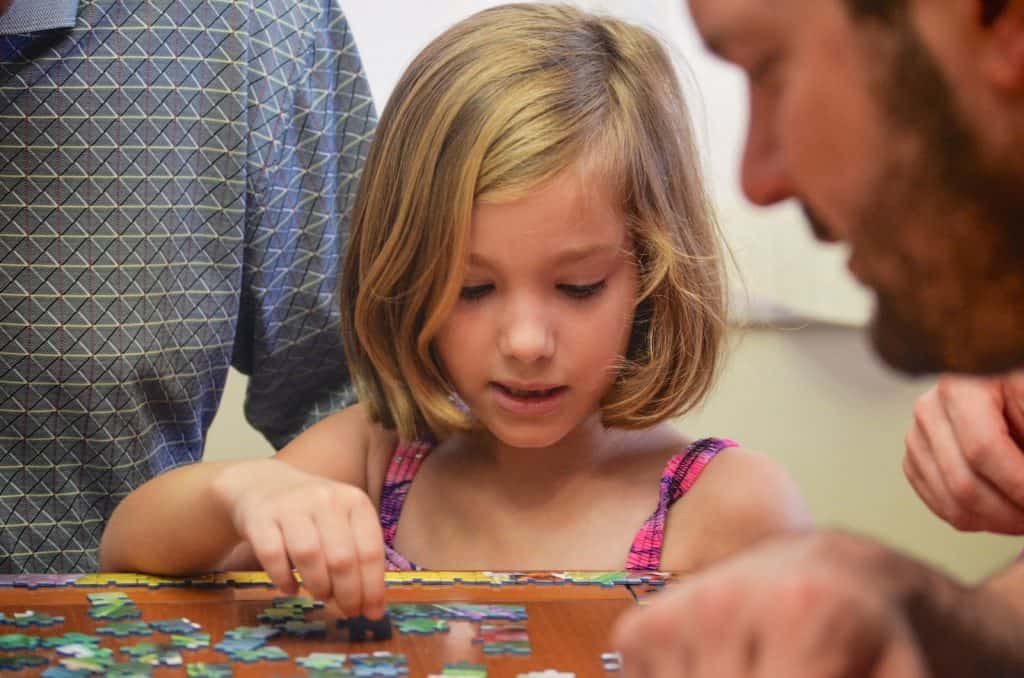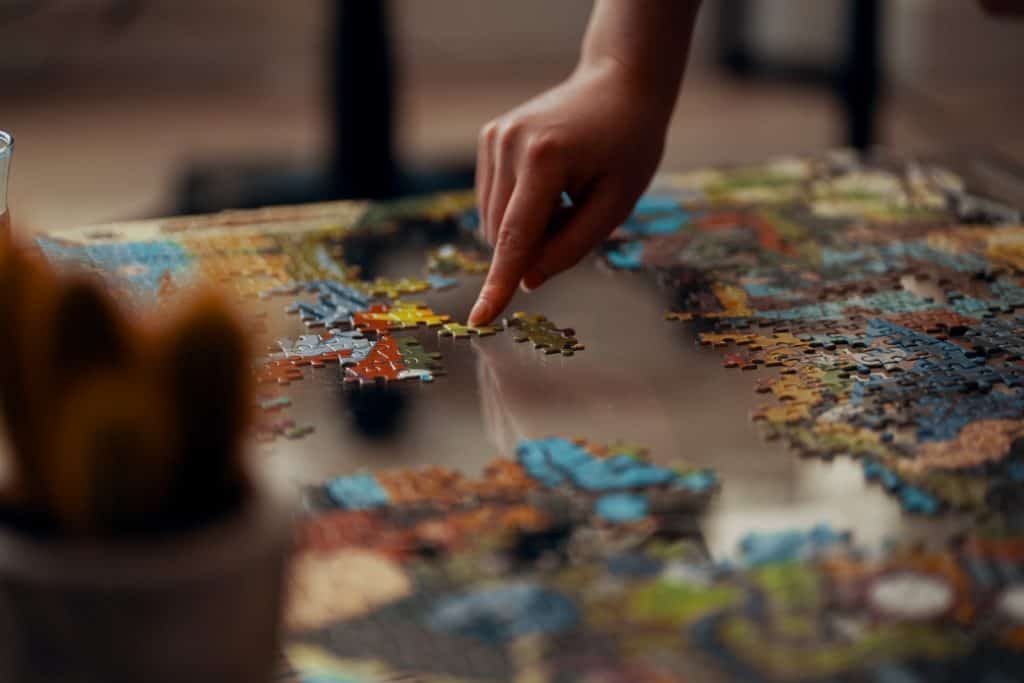Wondering what kind of person likes to do jigsaw puzzles? Keep reading to find out the answer.
John Spilsbury, a British cartographer, created the first jigsaw puzzle in 1767 and started a passion that has continued for centuries. At the time, these puzzles were called dissected maps because instead of having one large image like we do now, they were pieced together from small sections of geography.
Spilsbury, credited as the inventor of the jigsaw puzzle, originally created puzzles as an educational academic tool for wealthy children. He would draw maps and cut them into pieces so that by reassembling the map, children could learn geography.
The term “jigsaw puzzle” to describe these dissected maps didn’t arise until approximately 1880 when fretsaws were used to cut the puzzle shapes. At that time, the puzzles also included others subjects such as animals, people, landscapes, and more- not just maps.

What Kind of Person Likes to Do Jigsaw Puzzles?
If you’re looking for a fun activity that is tailored specifically to your personality type, working on a puzzle may be perfect for you. According to the Myers-Briggs resource 16personalities.com, ISFJ and INFJ personality types particularly enjoy this pastime. If you’re unfamiliar with Myers-Briggs terminology, let me explain: ISFJ stands for introversion, sensing, feeling and judgment.
While introverted, intuitive, feeling, and judging personality types are all similar in some ways, they each have unique characteristics that give them an advantage when it comes to problem-solving.

All About the ISFJ
ISFJs, also known as “The Defenders,” are compassionate individuals who reserve most of their energy for close friends and family. They have excellent observation skills, allowing them to remember intricate details others would miss. ISFJs often enjoy puzzles and games that put these memory skills to the test.
This personality type flourishes in an environment with order and routine. They follow instructions well and find comfort in performing habits consistently. Below is a list of other common ISFJ skills: Relying on logic and facts
- Well-organized
- Great at finding patterns
- To make a bigger picture, they like putting small details together
Do you know an ISFJ? They make great bookkeepers, counselors, teachers – but also magnificent puzzlers. Why? It is because unlike other personality types, they can stay present in the moment without always rushing to the next task at hand. And since puzzling is such an immersive activity that requires complete concentration, this makes ISFJs naturals at it!
All About the INFJ
The INFJ personality type, also known as “The Advocate” excels at jigsaw puzzles because of their creative and analytical nature. In fact, they often take on extra-challenging puzzles due to their idealistic nature.
The INFJ personality type is introverted but also enjoys using their minds, so they value time spent alone to recharge. However, they also cherish deep relationships and make great puzzle buddies. Puzzling presents an opportunity for them to let their mind relax and wander since INFJs have somewhat of a contradictory personality type. It’s the perfect activity to get an INFJ out of their own head.
Some skills of the NFIJ include:
- Good listener, good friend
- Well-organized
- Artistic
- Sensitive to the emotions of others
INFJs make wonderful entrepreneurs, writers, artists and religious leaders. They also tend to excel at jigsaw puzzles – but they’re not the only personality type that enjoys them.
What Kind of Person Likes to Do Jigsaw Puzzles?: What Is Says About Your Personality
If you’re not sure what Myers-Briggs personality type you are, don’t worry! You can take a free test to find out here. There are some things that people who love jigsaw puzzles say about everyone, regardless of their personality type. For example, did you know that people who love puzzles are actually called dissectologists?
If any of the following sound like you, you might be a dissectologist:
- Observant: you notice the world around you
- Detail-oriented: you remember the little things
- A problem-solver: you can look at situations from all angles
- Highly organized: you love a good puzzle sorting system
- Patient: you aren’t in a rush to the finish
- Goal-oriented: you are up for a challenge
- Analytical: you like formulating the best strategies for success
- Visual: you enjoy art
Puzzles For Other Personality Types
The other Myers-Briggs personality types can enjoy jigsaw puzzles too, just in different ways. While ISFJs and INFJs are the top puzzle-loving types, there are other types who also enjoy jigsaw puzzles. Some people don’t love doing them on their own but may find more enjoyment from doing them with a group. Here’s a quick break down of how the other personality typically approaches puzzles according to their type:
ESFJ: This type of person is all about practicality. They get a rush from crossing items off their to-do list and are always looking for ways to be more efficient. Jigsaw puzzles are a great way for them to slow down and relax, as it can be hard for them to commit to other types of puzzle games.
ENJFs and ENTPs: these types usually solve problems quickly, but they get bored just as fast. If you want them to enjoy puzzles, have them play with friends and turn it into a competition to see who can finish first.
ENFP and INFP: They’re always willing to take on a difficult challenge, and they especially love puzzles that are complex enough to really get their problem-solving skills going. But at the same time, the puzzle must be interesting enough to hold their attention since they tend to get bored easily.
INTPs: If you’re the type of person who sees people as puzzles, personality tests and other abstract quizzes can be fun for you. You likely have a very active imagination, so these types of things come naturally to you.
ISTP and ESTP: People who naturally think analytically usually do well with puzzles. Although, they often get antsy and need to take breaks while completing a puzzle because they can’t sit still for long periods of time.
INTJ: This type loves puzzles for the personal growth opportunities they offer. They enjoy mind-bending challenges, so solid color puzzles are a good idea for them.
ISTJ: If you love spending time by yourself and relaxing, puzzling may be the perfect activity for you. It’s not just a game – it can acts as self-care.
ENTJ and ESTJ: These types of personalities are unlikely to enjoy puzzles because they thrive on efficiency and productivity. However, you may be able to challenge them so that they sit down and help you with your puzzle for a few minutes.
ISFP and ESFP: Although these people are great at puzzles, they would rather live in the moment and enjoy puzzles as a social activity instead of committing to one puzzle.

